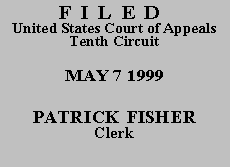

|
JOHNNY R. COSTA, Petitioner-Appellant, v. DAVID R. McKUNE, Respondent-Appellee. |
|
Before TACHA, McKAY, and
MURPHY, Circuit Judges.
This case is before the court on pro se petitioner Johnny R. Costa's request for a certificate of appealability ("COA"). Costa seeks a COA so that he can appeal the district court's denial of Costa's 28 U.S.C. § 2254 habeas corpus petition. See 28 U.S.C. § 2253(c)(1)(A) (providing that no appeal can be taken from a "final order in a habeas corpus proceeding in which the detention complained of arises out of process issued by a state court" unless the petitioner first obtains a COA). In his § 2254 habeas petition, Costa claimed that his appeal bond was excessive in violation of the Eighth Amendment. The district court concluded that Costa was procedurally barred from raising the claim because Costa had failed to timely raise the claim in a petition for review by the Kansas Supreme Court. Furthermore, Costa had failed to demonstrate that his procedural default was excused by cause and prejudice or that failure to reach the claim would result in a fundamental miscarriage of justice. See Coleman v. Thompson, 501 U.S. 722, 750 (1991).
Costa is entitled to a COA only upon "a substantial showing of the denial of a constitutional right." 28 U.S.C. § 2253(c)(2). This court has reviewed Costa's application for a COA and opening brief on appeal, the district court Order, and the entire record on appeal. That review demonstrates that the district court's conclusion that Costa's Eighth Amendment claim is procedurally barred is not reasonably debatable, subject to a different outcome on appeal, or deserving of further proceedings. See Barefoot v. Estelle, 462 U.S. 880, 883 n.4 (1983). Because Costa has not made a substantial showing of the denial of a constitutional right, this court DENIES Costa's request for a COA and DISMISSES this appeal.
ENTERED FOR THE COURT
Michael R. Murphy
Circuit Judge
*. This order and judgment is not binding precedent, except under the doctrines of law of the case, res judicata and collateral estoppel. The court generally disfavors the citation of orders and judgments; nevertheless, an order and judgment may be cited under the terms and conditions of 10th Cir. R. 36.3.